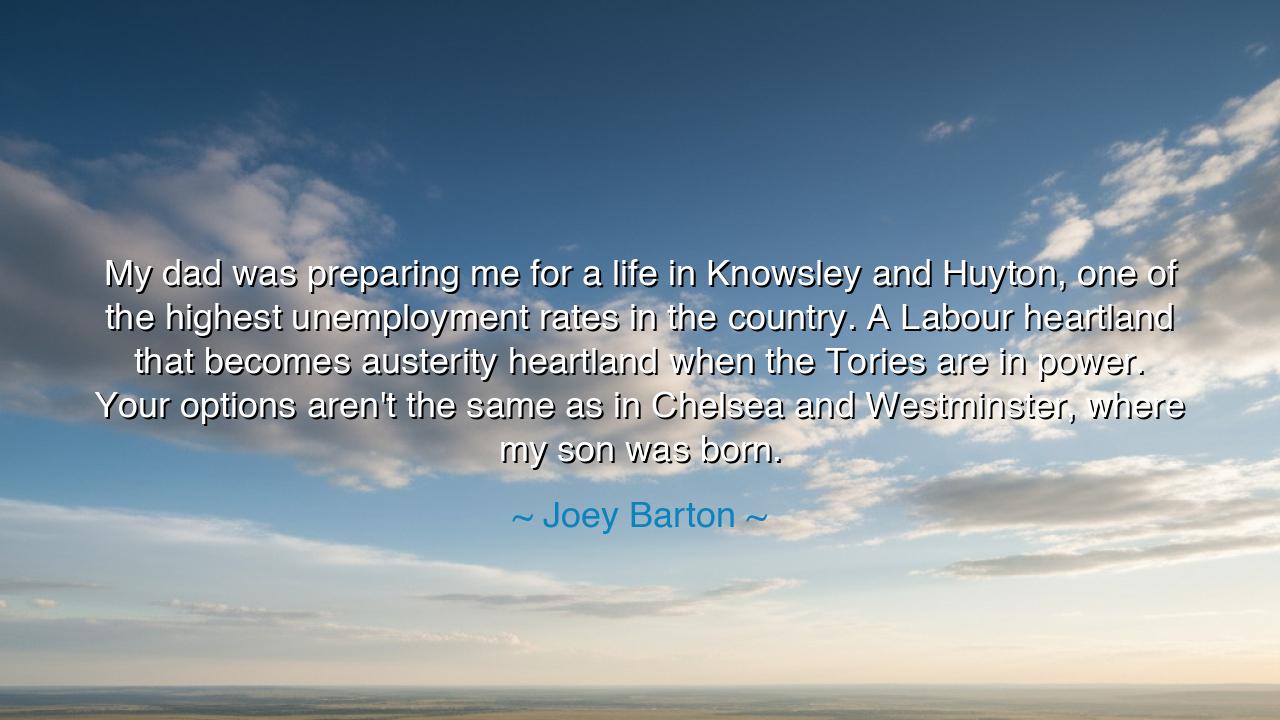
My dad was preparing me for a life in Knowsley and Huyton, one of
My dad was preparing me for a life in Knowsley and Huyton, one of the highest unemployment rates in the country. A Labour heartland that becomes austerity heartland when the Tories are in power. Your options aren't the same as in Chelsea and Westminster, where my son was born.






"My dad was preparing me for a life in Knowsley and Huyton, one of the highest unemployment rates in the country. A Labour heartland that becomes austerity heartland when the Tories are in power. Your options aren't the same as in Chelsea and Westminster, where my son was born." — Joey Barton
In these stark and reflective words, Joey Barton, a man forged in the working-class crucible of northern England, speaks not only of geography but of destiny. His words are more than social commentary—they are a meditation on class, inheritance, and the limits placed upon opportunity. When he says, “My dad was preparing me for a life in Knowsley and Huyton,” he evokes the age-old reality that the conditions of one’s birth often define the boundaries of one’s world. His father was not merely raising a child; he was arming him for survival in a land where dreams were often devoured by poverty. Barton’s reflection is thus both personal and universal—a testimony to the power of upbringing, and the weight of the world into which we are born.
The origin of this quote lies in Barton’s own life, a life of struggle, rebellion, and redemption. Born in Huyton, a district scarred by deprivation and unemployment, he grew up amidst a landscape where hope was not easily found. His father, aware of the hardships that awaited his son, sought to prepare him not for privilege but for perseverance. Barton’s later success as a professional footballer contrasts sharply with his beginnings, and this contrast forms the heart of his reflection. When he speaks of Chelsea and Westminster, where his own son was born, he is not boasting of escape—he is acknowledging the profound divide between two Englands: one of hardship and endurance, the other of ease and abundance.
This division is not new. Throughout history, the fate of nations has turned upon the chasm between the powerful and the poor. The ancient philosophers of Greece, the poets of Rome, and the prophets of every age have spoken of it. Barton’s words recall the voice of the Roman stoic Seneca, who said, “It is not the man who has little, but the man who desires more, who is poor.” Yet Barton’s reflection carries a different kind of wisdom—the wisdom of one who has seen inequality not as abstraction but as experience. He speaks for those whose options are not the same, whose dreams must fight through the weight of circumstance.
When Barton contrasts Knowsley and Huyton with Chelsea and Westminster, he is not merely speaking of places—he is naming worlds apart. The former is a realm of survival, where one’s worth is tested daily against adversity; the latter, a sanctuary of privilege, where choice is a birthright. His father’s preparation, therefore, was a kind of initiation—a lesson in resilience. To grow up in hardship is to learn early the laws of struggle: that dignity is not given, that work is holy, and that strength of spirit is worth more than comfort. In this way, Barton’s father was a philosopher of the street, teaching his son the unwritten wisdom of endurance.
Such contrasts have shaped heroes throughout history. Abraham Lincoln, born in a one-room cabin, learned through toil and loss the value of persistence; his humble beginnings gave him empathy for the common man. Nelson Mandela, raised in a rural village, grew to understand that freedom is not granted by the powerful but claimed by the courageous. Likewise, Barton’s journey, from the working-class north to the glimmering world of professional sport, is a modern parable of transcendence. Yet unlike those who forget their origins, he speaks not from pride, but from remembrance—from the understanding that privilege without gratitude is blindness, and that one must never forget the soil that formed their roots.
In this reflection lies a moral lesson for all who seek meaning in their own journey. It is easy to envy those born in Chelsea and Westminster, but envy blinds us to the truth that hardship breeds character. Those who come from struggle carry within them a strength that comfort can never teach. Barton’s story, like the stories of countless unsung souls, reveals that greatness is not determined by where one begins, but by how one bears their beginning. To those who face limited options, he offers an unspoken command: work, endure, and remember that every act of perseverance is a defiance of destiny.
So, my child of the future, take this wisdom as your own: honor where you come from, but do not let it define what you may become. If you are born into hardship, let it sharpen your will; if you are born into comfort, let it deepen your compassion. Do not despise small beginnings, for within them lie the seeds of greatness. As Joey Barton reminds us through his words, life does not grant equal paths—but it grants all the power to walk their path with purpose. Whether your birthplace is Knowsley or Westminster, your true home is not on a map, but in the courage with which you face the world. And that courage, born of struggle and gratitude, is the truest measure of a noble life.






AAdministratorAdministrator
Welcome, honored guests. Please leave a comment, we will respond soon